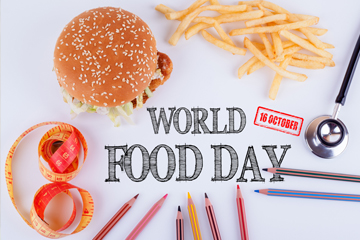 Though an adequate amount of food is produced to feed everyone on the planet, hunger is on the rise in some parts of the world. According to a new report released by United Nations, even after nearly a decade of progress, the number of people who suffer from hunger has slowly increased over the past three years, with about one in every nine people globally suffering from hunger today. October 16 is observed as World Food Day to tackle the issue of global hunger. The focus of this observance is that food is a basic and fundamental human right. The collective action observed across 150 countries has made World Food Day one of the most celebrated days of the UN calendar.
Though an adequate amount of food is produced to feed everyone on the planet, hunger is on the rise in some parts of the world. According to a new report released by United Nations, even after nearly a decade of progress, the number of people who suffer from hunger has slowly increased over the past three years, with about one in every nine people globally suffering from hunger today. October 16 is observed as World Food Day to tackle the issue of global hunger. The focus of this observance is that food is a basic and fundamental human right. The collective action observed across 150 countries has made World Food Day one of the most celebrated days of the UN calendar.
World Food Day is celebrated every year around the world on 16 October in honor of the date of the founding of the United Nation’s Food and Agriculture Organization (FAO) in 1945. The day is celebrated by many organizations concerned with food security, including the World Food Programme and the International Fund for Agricultural Development. People around the world, come together to declare their commitment to eradicate worldwide hunger from everyone’s lifetime in this special day. The event organized on this special day also promotes worldwide awareness and action for those who suffer from hunger and for the need to ensure food security and nutritious diets for all.
According to World Health Organization, an estimated 820 million people did not have enough to eat in 2018, up from 811 million in the previous year, which is the third year of increase in a row. This emphasizes the immense challenge of achieving the Sustainable Development Goal of Zero Hunger by 2030, says a new edition of the annual The State of Food Security and Nutrition in the World report.
For a #ZeroHunger world, this year, FAO has adopted the same theme of last year – “Our Actions are Our Future”. The theme is aimed at making us understand how healthy diets play a major role in our life.
Globalization, urbanization and income growth has drastically changed dietary habits. People have moved on to diets that are high in refined starches, sugar, fats, salt, processed foods, meat and other animal-source products, shunning seasonal, plant-based and fibre-rich dishes. Busy lifestyles lead people to spend less time preparing meals at home and increasingly rely on supermarkets, fast food outlets, street food vendors and take-away restaurants, which in long-run, can have detrimental effects on health and wellbeing.
To make healthy eating and #ZeroHunger a way of life, FAO offers a simple recipe which includes the following:
- Diet choices: FAO supports countries in the development, updating and implementation of dietary guidelines to make sure people get enough nutrients to be healthy and prevent chronic disease. These guidelines also used to develop nutrition policies and education programs:
- Eat plenty of fresh, ripe and seasonal vegetables
- Add more legumes, nuts and whole grains to your diet
- Reduce your intake on refined starches, sugar, fats and salt
- Try not to eat excessive amounts of meat and other animal-sourced products.
- Include nutritious ‘brown’ foods instead of refined ‘white’ foods
- Be careful while having fatty foods, because, unsaturated fat are better than saturated and trans-fats
- Planet Choices: While having healthy foods, it’s also important to consider the environmental impact of the foods we eat. According to FAO, the planet choices to follow are:
- Try to avoid buying foods that have excessive amounts of packaging
- To support biodiversity, diversify your diet – go traditional, local and seasonal
- Eat sustainably sourced fish – it is an indispensable source of protein, vitamins, minerals, and polyunsaturated omega-3 fatty acids, which are generally not found in staple foods.
- Avoid wastage
- Life Choices: The following life choices can lower rates of obesity and eating disorders in youth:
- Eating in company and cooking at home are important for your health and that of your children.
- Learn to read labels – understanding labels can help you choose a healthy diet. Food labels provide information on energy, salt, sugar, fat, etc. and help us to determine how nutritious a product is. They also tell us whether it’s safe to eat or not by mentioning “best before” date or “use by” date
- Be a critical consumer and don’t let packaging or advertising sway you
- Exercise for at least 30 minutes every day
- Ask for healthier meal choices
- Share your knowledge and respect for food
Celebrate #WorldFoodDay by sharing your individual action for #ZeroHunger or join the call by developing a group event or activity.